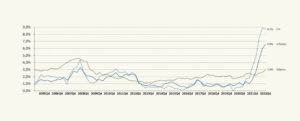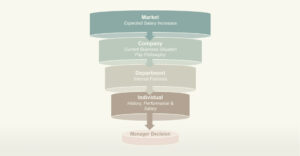Consumer prices are up 8,7%. Your salaries can go up 3,6%.
We are currently in a period of great macro-economic disruptions. A recession looms, interest rates have risen, war has broken out, an energy crisis is looming – and the inflation is rising and falling in sporadic jerks. How do you decide the right salary increase budget during all this disruption? Let’s look at how salaries and inflation affect each other. They are connected, but not the way many thinks.
Background: How inflation and salary levels correlates
Inflation and salaries generally move in the same direction – but they are not impacted by the same factors:
- Salaries are driven by changes to supply/demand for labor which can be caused by demographic trends, labor participation rates, technological advances, and growth in productivity
- Inflation is changes in the cost of a market basket of goods (such as groceries and fuel) but are driven by larger demand caused by increased purchase power because of salary increases
- Salaries drives inflation, but inflation should not drive-up salaries
There has been a net wealth increase for employees since 2013, where salary levels have increased more than the inflation.
- There is no rule saying salaries must follow inflation
- There is no tradition saying salaries must follow inflation
- This has up until now been to the benefit of the workforce
Development in inflation, consumer prices and salaries since 2005:

Sources: www.statistikbanken.dk/pris111, www.statistikbanken.dk/ILON15, Klar_ Flash Survey, Nordic Salary Review Budgets 2022/23
However, the cost of living has increased dramatically. Expectations to the 2023 salary increases are high. Substantially higher than the projected salary increases:
- 2022 Overall inflation: 6,6%
- 2022 Consumer price index 8,7%
- Projected salary budget increase 2023: 3,6%
So, what to do?
The why: It’s a management decision
Let us assume that your company will follow the market. You assign a salary increase budget of 3,6%. Roughly half the general inflation and 40% of the rise in consumer prices.
It is important to anchor the communication with top management. Begin with a message from the CEO to all people. Then cascade this via leadership levels to reach the whole organization, explaining the situation of the company in the new economic environment.
A strong commitment to fairness and transparency when distributing pay increases, is necessary to build company-wide support and acceptance.
- This is a management decision
- It is not a decision taken by HR or your leader
- We will follow the general salary developments to keep our current pay position in the labor market
- Costs are up, challenging times are ahead
- We are committing to fairness and transparency
The What: Who gets a raise?
Your actual response to these challenges should depend on your situation. Your response will to a substantial extent be decided by the shape your company is in entering this period of increased financial risk.
Your salaries should be:
- Competitive and aligned with the market
- Designed to reward high performers, top talents & key skills
- Free of structural inequalities (pay gaps)
If they are, then you don’t have to take any special action. Just divide the budget equally across the areas reflecting the performance and pay distribution across your organization.
If they are not? You should take extra care. Focus on the flight risks.
- Find the high performers, the young risers, and the key contributors – and make sure they are rewarded appropriately
- Address your structural inequalities – gender pay gaps and/or gender representation, as well as your other ED&I demographics – and start fixing these
- Benchmark to make sure salaries still are competitive
Your response should address the issues at hand. The immediate challenges could be large. But even when doing short term fixes, have the long term in mind. Look for opportunities to improve fairness and transparency, to increase your engagement.
The How: Leadership engagement
For your people leaders to know what is expected of them in the salary review process, you will need to train them in:
- The macroeconomic context
- The salary setting funnel
- How to conduct salary conversations with their employees

This is a company-wide process so make sure each people leader is starting their communication on the same storyline – reflecting the top management decisions and the situation of the company in the market it operates in.
The road ahead: Is luck a strategy?
In these volatile times with numerous macro-economic factors influencing the labor market you will have to accept more uncertainty than usual.
- Expect to be surprised
- Be initiative-taking towards economic and labor market changes
- React and communicate to own people if momentous change happens
At the end of the day, once you have prepared as thorough and holistic as possible, you will have to take a deep breath and decide your 2023 salary budget – and then cross your fingers.



